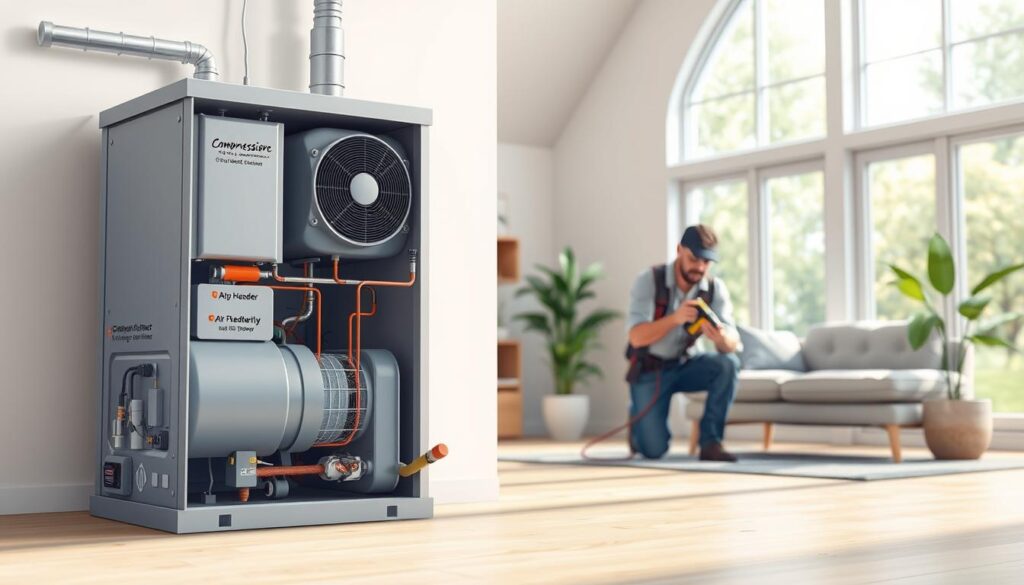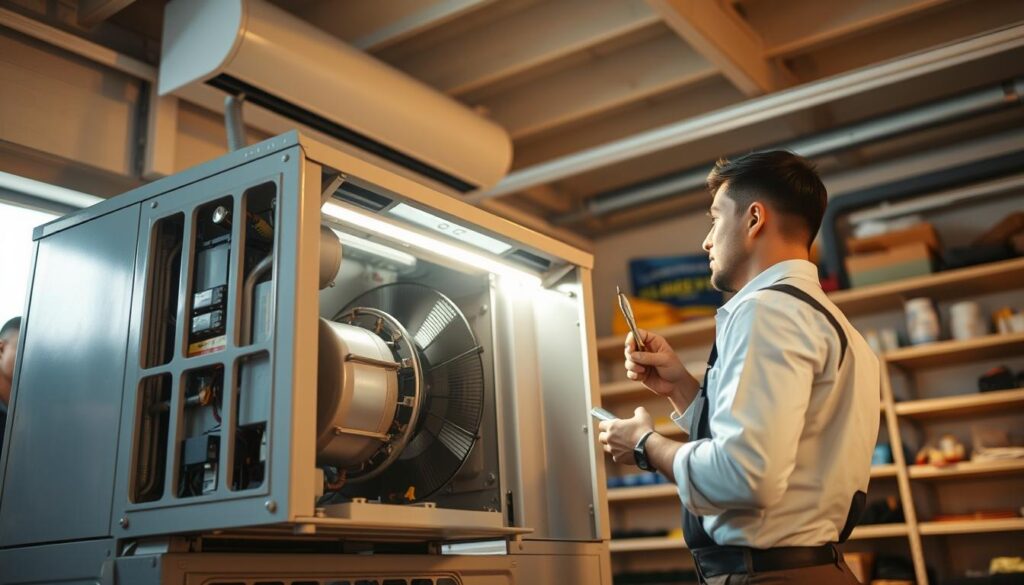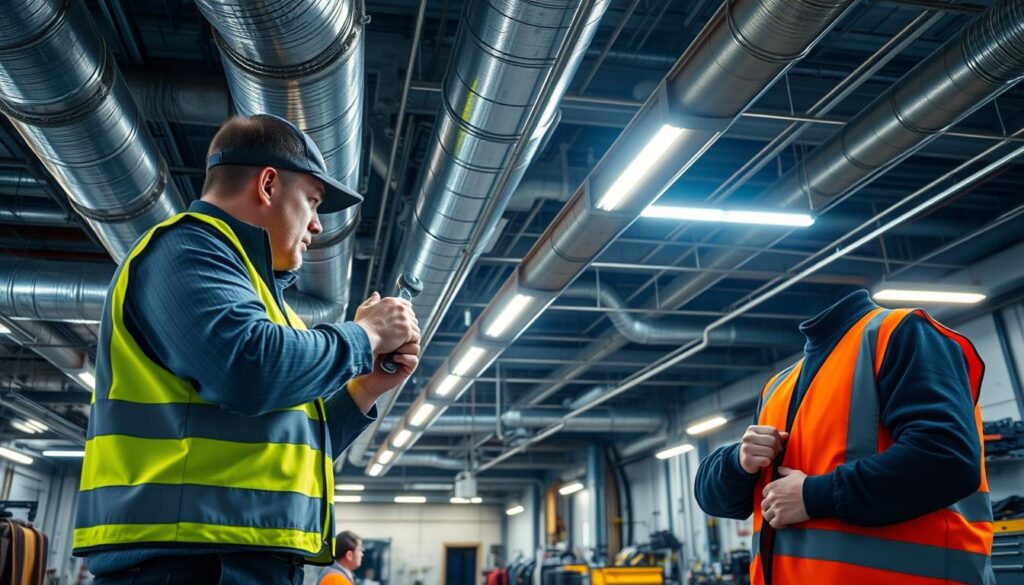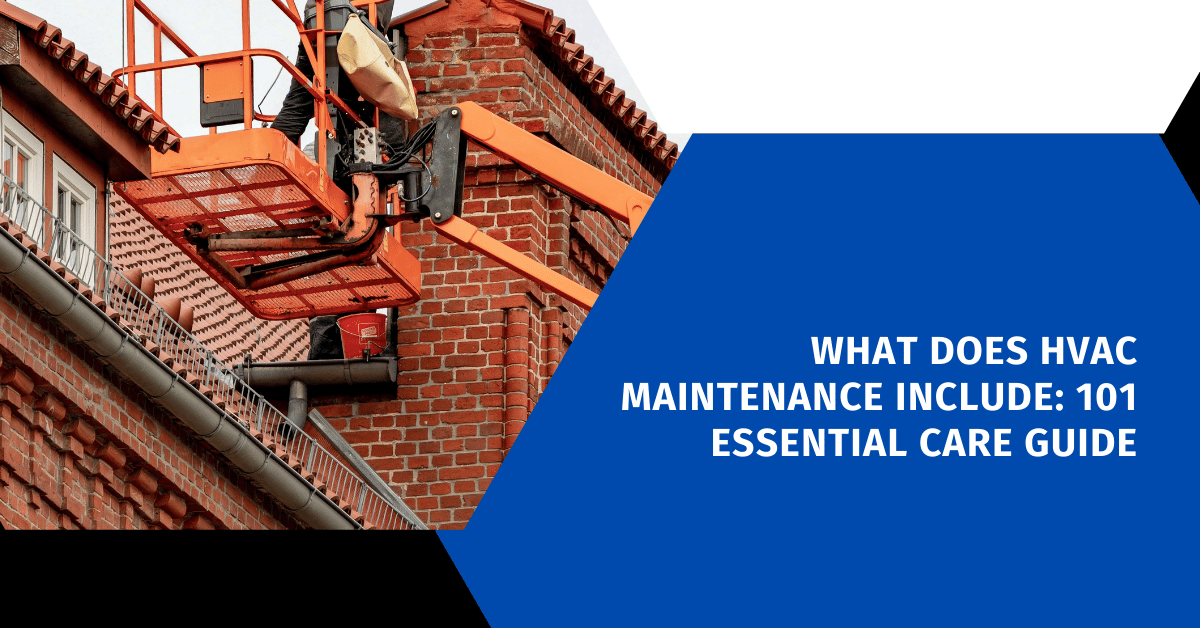Affiliate Disclosure
HVAC Guide Guys is a participant in the Amazon Services LLC Associates Program, an affiliate advertising program designed to provide a means for sites to earn advertising fees by advertising and linking to Amazon.
What Does HVAC Maintenance Include? HVAC system servicing is more than just a routine check-up. It’s a detailed approach to keep your heating, ventilation, and air conditioning systems running smoothly and efficiently. What does HVAC maintenance include? It involves a series of important inspections, cleanings, and adjustments to ensure your system works at its best.

Are you unknowingly risking your home’s comfort and energy efficiency by neglecting your HVAC system? Understanding what HVAC maintenance includes could be the key to preventing unexpected breakdowns and costly repairs.
Your HVAC system is the heart of your home’s comfort, working hard to keep the perfect temperature and air quality. Regular maintenance stops unexpected failures, cuts down energy use, and makes your expensive equipment last longer.
Key Takeaways
- HVAC maintenance protects your home’s comfort and efficiency
- Regular servicing prevents costly unexpected repairs
- Maintenance helps optimize energy consumption
- Professional inspections catch problems early
- Proper care extends the lifespan of your HVAC system
Table of Contents
Understanding HVAC Maintenance Basics and Its Importance
Your home’s HVAC system is made up of many parts that need regular care. Getting your HVAC checked every year is not just a good idea. It’s essential for keeping your home comfortable and your investment safe.
Preventive maintenance for HVAC systems is more than just fixing things when they break. It’s a detailed plan to keep your heating and cooling systems working well. This means they run safely and don’t cost too much to use.
Key Benefits of Regular HVAC Servicing
Regular HVAC maintenance offers many benefits for homeowners:
- Enhanced system performance and reliability
- Reduced risk of unexpected breakdowns
- Improved indoor air quality
- Extended equipment lifespan
Impact on Energy Efficiency and System Longevity
A well-maintained HVAC system uses less energy and lowers your bills. Regular maintenance can boost system efficiency by up to 15%. This means big savings over time.
Cost Savings Through Preventive Care
Spending on annual HVAC maintenance can save you a lot of money. Catching small problems early can stop big, expensive repairs. This could save you hundreds or even thousands of dollars.
“An ounce of prevention is worth a pound of cure” – this saying is very true for HVAC systems.
Explore Our HVAC Shop
Looking for top-rated HVAC tools, parts, and accessories? Visit our shop and find the perfect solution for your needs.
Visit the ShopWhat Does HVAC Maintenance Include: Complete System Overview
Knowing what HVAC maintenance includes is key to keeping your home’s heating and cooling system working well. A detailed checklist covers important parts of your HVAC system’s performance and life span.
Your HVAC system needs regular care to avoid sudden failures and keep it running smoothly. Professional technicians usually check several key areas during maintenance:
- Comprehensive system inspection
- Cleaning critical components
- Checking electrical connections
- Testing safety controls
- Verifying system performance
The main aim of HVAC maintenance is to keep your system at its best. Regular maintenance can prevent expensive repairs and make your heating and cooling equipment last longer. Technicians carefully check each part to find problems early.
Important maintenance tasks include:
- Lubricating moving parts
- Checking refrigerant levels
- Inspecting belts and motors
- Calibrating thermostat settings
- Cleaning air filters
By choosing regular HVAC maintenance, you’ll boost your system’s performance. You’ll also make your home more comfortable and improve the air quality. Professional technicians can create a maintenance plan that fits your HVAC system’s needs.
Essential Furnace Maintenance Tasks and Procedures
Keeping your home warm and safe is key. Regular furnace care stops sudden breakdowns and makes your furnace last longer. Experts say a full maintenance plan is best.
Good furnace care means doing several important things. These steps keep your system working well and safely:
- Comprehensive system inspection
- Cleaning and lubrication of key components
- Performance and safety checks
- Efficiency optimization
Burner and Heat Exchanger Inspection
The furnace’s heart needs careful checks. Technicians look at the burner area for:
- Debris and carbon buildup
- Potential corrosion signs
- Proper flame pattern
- Heat exchanger structural integrity
“A well-maintained furnace can improve energy efficiency by up to 20%,” says HVAC expert Michael Reynolds.
Safety Controls and Gas Line Checks
Checking safety is a big part of furnace care. Experts check gas lines, pressure, and safety systems.
| Safety Component | Inspection Focus | Potential Risk |
|---|---|---|
| Gas Valve | Proper Sealing | Gas Leaks |
| Pressure Regulator | Correct Pressure | System Malfunction |
| Carbon Monoxide Detector | Functionality | Poisoning Hazard |
Blower Component Maintenance
The blower system needs special care. Technicians clean, adjust, and lubricate it for smooth and efficient air circulation.
Getting professional furnace maintenance is smart. It keeps your home cozy and your family safe. Make sure to get regular checks to keep your heating system in top shape.
Air Conditioning System Maintenance Requirements

Your air conditioning system needs regular care to work well and save energy. A tune-up is key to keep your cooling system running smoothly in summer.
Regular AC maintenance includes important tasks to avoid sudden breakdowns and extend your system’s life:
- Clean condenser and evaporator coils thoroughly
- Check and adjust refrigerant levels
- Inspect electrical connections for any issues
- Clear and clean condensate drain lines
During a tune-up, experts check your cooling system’s parts carefully. They look for problems early to avoid expensive fixes. Proactive maintenance can save you a lot of money.
Important areas to focus on during AC maintenance include:
- Checking how well the system works
- Lubricating moving parts
- Adjusting thermostat settings
- Testing the system’s efficiency
Getting your air conditioner tuned up before summer starts is smart. It keeps your home cool, saves energy, and prevents sudden system failures.
Explore Our HVAC Shop
Looking for top-rated HVAC tools, parts, and accessories? Visit our shop and find the perfect solution for your needs.
Visit the ShopProfessional vs DIY HVAC Maintenance Guidelines
Maintaining your HVAC system is a mix of DIY tasks and professional inspections. Knowing what you can do yourself and when to call a pro is key. It keeps your system running well and saves you from expensive fixes.
Tasks Suitable for Homeowners
Some HVAC upkeep is easy for homeowners to do:
- Regularly changing air filters every 1-3 months
- Cleaning outdoor unit surfaces from debris and vegetation
- Checking thermostat batteries
- Ensuring vents and registers are unobstructed
- Visually inspecting system components for obvious damage
When to Call a Professional
Some HVAC tasks need a pro’s touch. You should get a certified technician for:
- Refrigerant level checks and recharging
- Electrical system diagnostics
- Complex mechanical repairs
- Annual complete system checks
- Gas line and combustion safety inspections
Safety Considerations
Always put safety first when doing HVAC maintenance. Disconnect power before any internal inspections, wear protective gear, and don’t try repairs you’re not sure about. HVAC pros have the skills and tools to do risky jobs safely.
Seasonal HVAC Maintenance Schedule
Keeping your HVAC system in top shape all year is essential. It prevents sudden failures and keeps your system running smoothly. This is true for every season.
Plan your HVAC maintenance with a seasonal strategy. It tackles each season’s unique challenges. This approach saves money and keeps your home cozy all year.
- Spring Maintenance:
- Clean or replace air filters
- Inspect outdoor AC unit for debris
- Check refrigerant levels
- Test cooling system performance
- Fall Maintenance:
- Clean or replace furnace filters
- Inspect heating system components
- Check carbon monoxide detections
- Seal any air leaks around windows and doors
For thorough seasonal upkeep, get professional inspections before the busy seasons. This early check can catch problems before they cost a lot to fix.
Professional tip: Create a maintenance calendar to track your HVAC system’s seasonal needs and routine checkups.
Regular maintenance is vital. It extends your HVAC system’s life and keeps energy use low all year.
Air Filter Maintenance and Replacement Protocols
Keeping your HVAC system’s air filter clean is key to its performance and air quality. Replacing the filter regularly ensures your system works well. It also keeps your home’s air clean from harmful particles.
Good air filter care is more than just cleaning. It’s about knowing your home’s needs and picking the best filter.
Types of Air Filters
There are different air filters, each with its own level of protection and efficiency:
- Fiberglass filters: Affordable but less effective
- Pleated filters: Better at catching particles
- HEPA filters: The best for purifying the air
- Washable filters: Good for the environment and reusable
Replacement Frequency Guidelines
How often you need to replace your air filter depends on a few things:
- Standard homes: Replace every 90 days
- Homes with pets: Replace every 60 days
- Homes with allergies: Replace every 30-45 days
“A clean air filter is your first line of defense against indoor air pollution.” – HVAC Maintenance Experts
Impact on Indoor Air Quality
Replacing your air filter regularly improves your home’s air quality. A clean filter catches dust, pollen, pet dander, and more. This stops them from spreading through your home.
Ignoring air filter replacement can harm your system’s efficiency. It can also increase energy costs and pose health risks. Spend a little time on regular maintenance for a healthier, more comfortable home.
Ductwork and Ventilation System Care

Your home’s ductwork is key to efficient HVAC system servicing. Many overlook the need for proper duct maintenance. This can greatly affect your HVAC system’s performance and air quality.
During HVAC system servicing, technicians do detailed duct inspections. They look for problems that could harm your home’s comfort and energy use.
- Inspect accessible ductwork for visible damage
- Check for air leaks around connections
- Look for signs of dust accumulation
- Ensure proper insulation on duct surfaces
Duct maintenance is vital for your HVAC system’s best performance. Regular cleaning and sealing can prevent air quality issues and reduce energy consumption.
| Duct Maintenance Task | Frequency | Benefit |
|---|---|---|
| Visual Inspection | Every 6 months | Detect possible damage early |
| Professional Cleaning | Every 3-5 years | Improve air quality |
| Seal Air Leaks | As needed | Boost energy efficiency |
During HVAC system servicing, experts thoroughly check your ductwork. They look for:
- Structural integrity of duct sections
- Proper sealing at connection points
- Evidence of moisture or mold growth
- Insulation condition
By focusing on ductwork maintenance, you can ensure your HVAC system works well. This leads to better indoor air quality and energy savings.
Electrical Components and Safety Checks
Preventive maintenance for HVAC systems is key. It involves checking electrical parts to keep your system safe and working well. Electrical problems can grow into big issues if not fixed early.
Professional HVAC technicians do important electrical safety checks during maintenance:
- Inspecting electrical connections for tightness
- Checking wiring for signs of wear or damage
- Testing voltage and current on motor components
- Evaluating control board functionality
- Examining capacitor performance
Your HVAC system’s electrical parts are complex and need care. Improper handling can lead to significant safety risks. Capacitors, control boards, and motor windings need special skills to fix.
“Electrical safety in HVAC maintenance isn’t just about preventing system failure—it’s about protecting your home and family.” – HVAC Safety Expert
During HVAC maintenance, experts do detailed electrical checks. They use special tools to test electrical resistance and find short circuits. They also look for signs of wear on parts.
Regular electrical checks can prevent sudden failures, save energy, and make your HVAC last longer. Always get a pro to check your electrical parts for the best performance and safety.
Explore Our HVAC Shop
Looking for top-rated HVAC tools, parts, and accessories? Visit our shop and find the perfect solution for your needs.
Visit the ShopAnnual HVAC Maintenance Checklist for Homeowners
Keeping your home’s heating and cooling system in top shape is key. It ensures your system works well, saves energy, and lasts longer. A detailed maintenance checklist helps you stay ahead and avoid sudden issues.
Your HVAC maintenance plan should cover seasonal needs and regular checks. Breaking tasks into smaller steps helps your system run smoothly all year.
Spring Maintenance Tasks
- Clean or replace air filters
- Inspect outdoor AC unit for debris
- Check refrigerant levels
- Clean condensate drain line
- Test thermostat functionality
Fall Preparation Steps
- Inspect furnace and heat exchanger
- Check gas connections
- Lubricate moving mechanical parts
- Test safety controls
- Clean heating system components
Monthly Monitoring Points
| Area | Inspection Task | Recommended Action |
|---|---|---|
| Air Filters | Visual check | Replace if dirty |
| Thermostat | Battery and settings | Replace batteries, verify programming |
| Vents | Airflow and blockages | Clear any obstructions |
Professional maintenance is vital. Make sure to schedule annual inspections to go along with your own maintenance routine.
Conclusion
Knowing what HVAC maintenance includes is key to keeping your home comfortable. It’s not just about avoiding breakdowns. It’s also about making sure your heating and cooling work well, saving you money and keeping it running longer.
Your HVAC maintenance plan should mix professional help with your own care. By getting annual checks and doing simple tasks like changing filters, you’ll keep your system in top shape. This way, you avoid sudden problems and keep your system working great all year.
Choosing to maintain your HVAC system well has big benefits. You’ll breathe cleaner air, use less energy, and pay less for utilities. Most importantly, you’ll have a comfortable home, knowing your temperature control is reliable and efficient.
Every HVAC system is different, so your maintenance needs might change. Create a plan that fits your system’s age, what the maker says, and your local weather. By taking good care of your HVAC, you’ll make sure your home stays comfortable for a long time.

